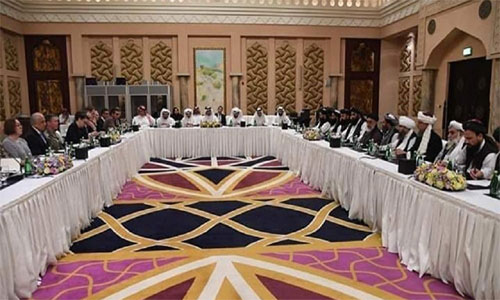The eighth round of talks has been ushered in between the Taliban and US representatives in Qatari capital of Doha. The two sides seem hopeful about the outcome of this round, but Afghans still view the talks with hope and fear.
The US-Taliban talks continued for almost a year, but so far they put no practical result on Afghanistan’s security situation. Instability lingers on and Afghans continue losing their lives in suicide bombings and terrorist attacks carried out by the Taliban militant fighters, which triggered public mistrust in the Taliban.
US Special Envoy Zalmay Khalilzad tweeted that “if the Taliban do their part, we will do ours, and conclude the agreement we have been working on”.
Before starting talks with the Taliban, Khalilzad met with Afghan officials citing it “most productive visit” adding that “negotiating team and technical support group are being finalized”.
He, then, visited Islamabad and discussed with Pakistani Prime Minister Imran Khan, Foreign Minister Shah Mehmood Qureshi, and Chief of Army Staff General Javed Bajwa. Khalilzad outlined the positive momentum in the peace process.
Talking to officials in Afghanistan and Pakistan, Khalilzad stated peace would require reliable assurances from Afghanistan and Pakistan and neither of the two country’s soil should be used as threat to the other. He added, “Such assurances on top of an intra-Afghan comprehensive peace agreement will allow increased regional economic integration, connectivity and development”.
Khalilzad also tweeted that the Taliban were signaling to conclude an agreement and the US side was ready for that. It indicates that the two sides will reach an agreement this time. Washington is also seeking to reduce its forces in Afghanistan, which is part of an agreement with the Taliban. If the US and Taliban wrap up their meeting with a positive outcome, the Kabul government is likely to start talks with the Taliban leadership.
To view the talks from the prism of an ordinary Afghan, people have mixed emotions about the outcome. Generally speaking, Afghans feel relieved when they hear that peace will emerge soon. They imagine that they would be able to breathe in a violence-free country and their life will not be threatened any more by daily suicide bombings or terrorist attacks, or at least the level of violence will reduce to a great extent.
But there are still feelings of fear and despair. First, what if the Taliban resume their harsh ideology after returning. They view the Taliban with mistrust and do not believe that their ideology has been moderated despite the Taliban’s claim. Women fear the most for being more vulnerable to the Taliban’s parochial mindset.
Second, Afghans ask what if the country falls into civil unrest as it did after the withdrawal of the Soviet Union. They fear that the Taliban and the Afghan government will not reach a peaceful agreement. With this in mind, Afghans urge the Taliban interlocutors for strong assurance and an international group to make sure that the agreement is being observed by the two sides.
Since Afghans paid heavy sacrifices for democracy and human rights, they are concerned that peace talks should not put them at stake. Furthermore, there is lack of trust between state and nation. Therefore, Afghans fear that there are a number of power thirsty individuals within the government’s machinery to jeopardize national interests for their self-interests.
Pakistan is also expected to play its role constructively in the peace talks. The repaired relations between Islamabad and Washington trigger hope that Islamabad will put its weight behind the peace process to facilitate the US honorable exit and broker talks between Kabul and the Taliban.
Khalilzad said, “We are pursuing a peace agreement not a withdrawal agreement; a peace agreement that enables withdrawal”. However, the Taliban seem to have focused all their energy and attention on the US troop pullout.
What Afghans want is that troop withdrawal should not create a vacuum in the country so that neither the US investment of “blood” and “treasure” nor Afghans’ sacrifices are wasted. Talks should not be a pyric victory for Afghan nation and no decision should be made out of excitement.
Meanwhile, the negotiating sides should leave no loophole in the written agreement to be capitalized on later by the Taliban. They have to clarify everything after the agreement, too. So the Taliban interlocutors must consider the public concern in Afghanistan and try to bring in sustainable peace and prosperity and Afghanistan’s territory should be neither used against any other territory nor do any other countries violate Afghanistan’s territorial integrity.
Home » Opinion » Many Ifs and Buts in Peace Talks
Many Ifs and Buts in Peace Talks
| Hujjatullah Zia

